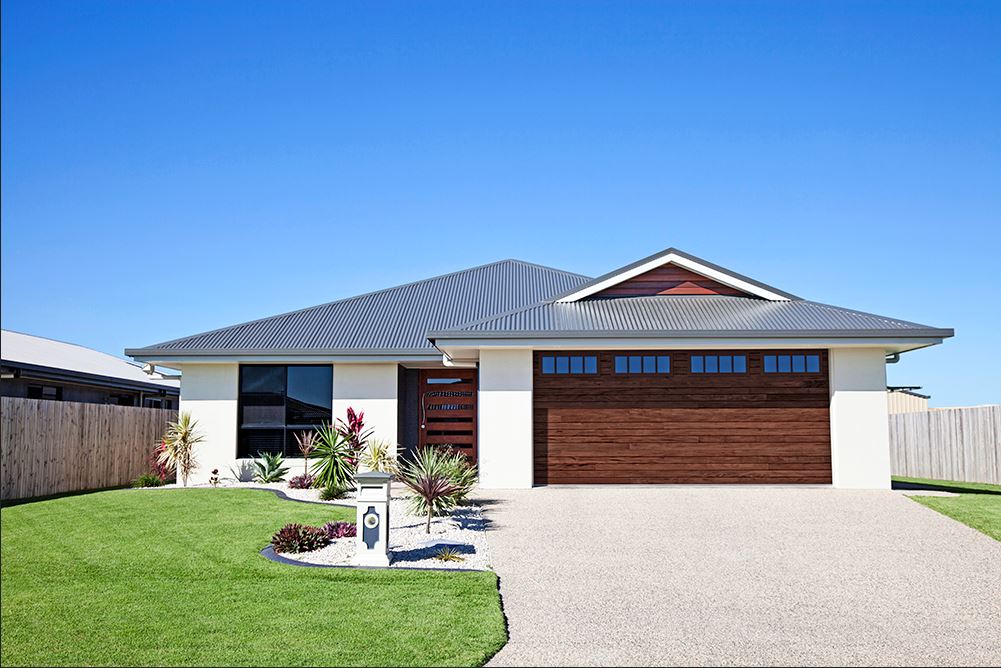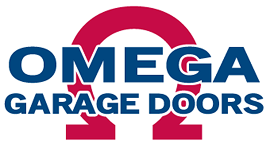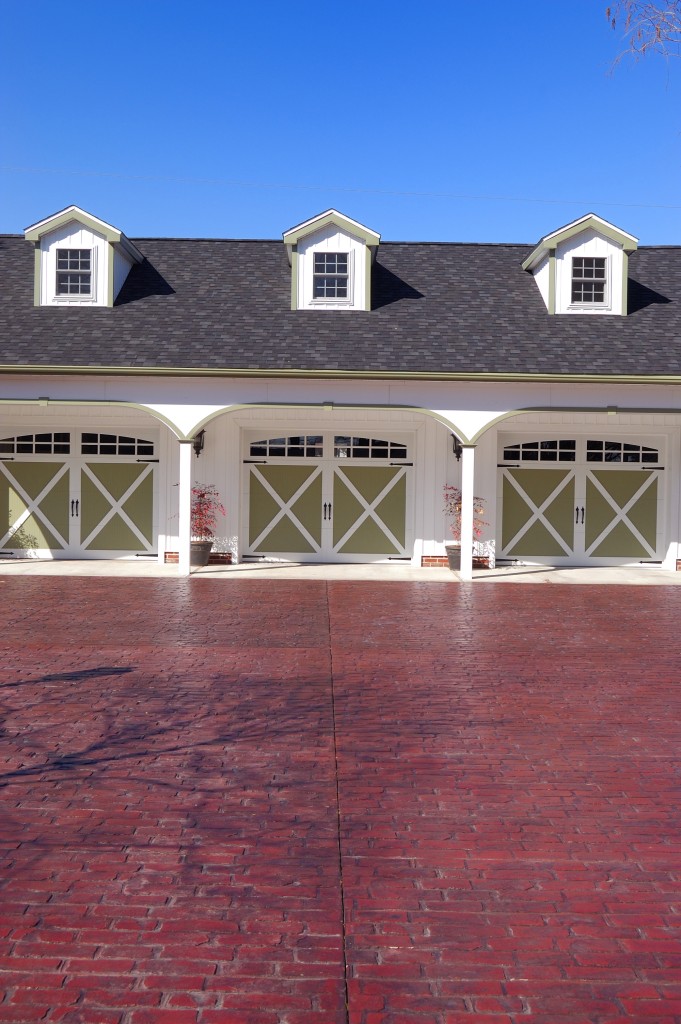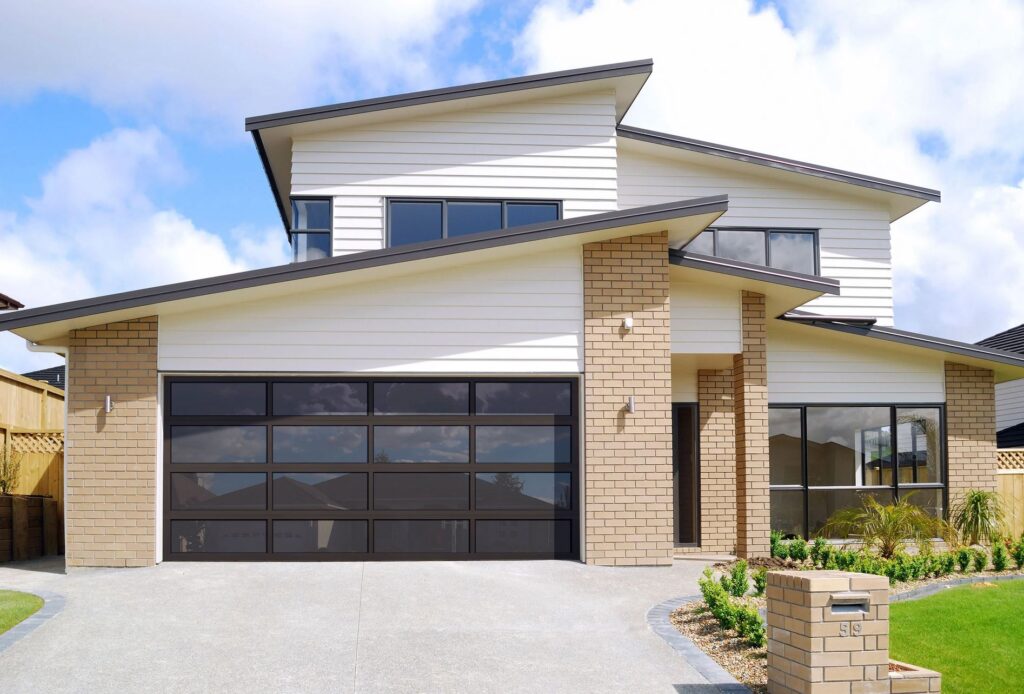Steel, wood, fiberglass, and aluminum. Garage doors are available in a variety of materials. Besides the obvious differences in appearance, different garage door compositions may better suit your budget, climate, and aesthetic.
Continue reading to explore the pros and cons of the 4 most common garage door materials.

Steel
Cost: $-$$
Climates: All
Steel is a largely popular garage door material due to its design flexibility, durability, and overall value. Steel garage doors are available in an endless number of design options and provide a cheaper, more practical alternative to natural wood. Opt for insulation to strengthen your garage door and boost R-value.
Compared to wood garage doors, steel is significantly lighter-weight and easier to maintain. Accents Woodtones give you the beauty and texture of wood, with the durability and reliability of steel.
The primary disadvantage to steel is that it is susceptible to corrosion and rust. Rusting along the bottom section of a steel garage door is particularly common in areas where excess salt is used for de-icing in the winter months. To help preserve the life of your steel garage door, we recommend washing it at least twice a year to remove grime and dirt.
Pros
- Low maintenance
- Durable
- Various style options
- Economical
Cons
- Moderate resistance to dents
- Not a natural insulator
- Scratches can rust if not fixed quickly
Wood
Cost: $$$-$$$$
Climates: Best in mild climates
Wood garage doors provide any exterior with a sense of timeless elegance. As a renewable resource, wood offers a more eco-friendly option to consider when purchasing a new garage door. Available at C.H.I Overhead Doors in a variety of Overlay Carriage House designs, wood types, and customization options, wood garage doors are an excellent option for homeowners wanting a custom, unique look.
In addition to the higher upfront cost of a wood garage door, it is also important to consider the cost of the maintenance required to preserve its beauty. Without proper, regular maintenance, a wood door will begin to fade, rot, warp, or chip.
Wood garage doors are best suited for mild climates. Drastic changes in outside temperatures as well as frequent contact with moisture (from rain, snow, or humidity) can cause wood to expand and warp as it absorbs this moisture.
Pros
- Beautiful, rustic look
- Natural insulator
- Various overlay designs
- Field-staining to achieve desired look
Cons
- Heavy and difficult to operate manually
- Requires regular maintenance
- Has potential to warp, swell or rot
Fiberglass
Cost: $-$$
Climates: Warm, humid climates
Fiberglass is often overlooked when homeowners are choosing a garage door material. Fiberglass, however, most closely mimics the defined grain texture of authentic wood. Unlike wood, however, fiberglass garage doors will not shrink, warp, or crack – making them particularly ideal for homeowners living in humid climates.
Available at C.H.I. Overhead Doors in both overlay carriage house and raised panel designs, fiberglass provides an economical, low-maintenance alternative to wood. Because fiberglass is semi-transparent, this material will also allow more natural light into your garage.
Fiberglass is best suited for warmer climates, and is not recommended for windy coastal areas. High winds can not only damage fiberglass, but also evoke a noise that many find irritating. Another important consideration is that fiberglass cannot be repaired if damaged; the garage door must be replaced entirely.
Pros
- Won’t warp, shrink, or corrode from moisture
- Allows light into garage
- Won’t contract or expand from temperature changes
- Low maintenance
Cons
- Must be replaced if damaged
- Brittle and susceptible to wind damage
- Has tendency to crack or yellow with age
Aluminum & Glass
Cost: $$-$$$
Climates: All*
Aluminum and glass garage doors offer an eye-catching, contemporary look to a variety of design applications, both exterior and interior. Available in anodized coatings, 188 powder coat colors, and various glass options, C.H.I Overhead Doors Full-View aluminum and glass garage doors can be customized to fit your precise vision.
Because aluminum is lighter than steel, it is also less durable. Strong winds or hail can cause dents in aluminum, which are difficult to fix without a specialist. We also recommend adding insulation to aluminum section rails to increase R-value and boost thermal protection for your garage space.
* While suitable in all climates, aluminum is sensitive to extreme heat – harsh summers can reduce the durability of this material.
Pros
- Naturally resistant to rust and corrosion
- Customizable
- Allows max. light into garage
- Low-maintenance
Cons
- Low R-value
- Not fully waterproof
- Less durable than steel
- Privacy issues depending on glass selection
Ready to choose?
Omega Garage Doors provides a wide selection of new residential garage doors that can transform the look of your home – choices from manufacturers who offer high quality, durable doors, and warranties.
Plus, our having over 40 years experience means that we can help you find a door that best suits your needs and budget!



